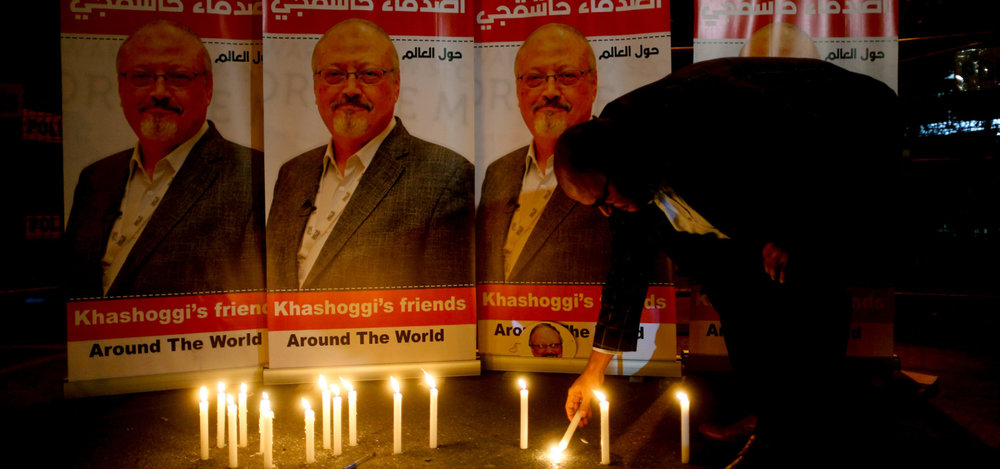Saudi regime’s war on free speech, free press

TEHRAN _ A free and independent media is the watchdog of society, custodian of public interest and stimulus of political and social change. For a free and fearless journalist, truth is sacred, even though it may be unpalatable. In our times, to invoke George Orwell, telling a truth has become a revolutionary act, and often it has landed journalists and activists in troubled waters.
The state of independent press in most of the Arab states paints a grim picture. In Saudi Arabia, for example, there are clear-cut ‘do’s and don’ts’ for journalists and a red line they must not breach under any circumstances. The despotic monarchs in Riyadh are extremely sensitive to anything critical of them. Hence, there is massive repression of independent voices and surveillance of journalists.
The cold-blooded murder of Saudi journalist Jamal Khashoggi inside the Saudi consulate in Istanbul has dominated international headlines in recent weeks and shaken people around the world. Khashoggi was a strong critic of the autocratic regime in Riyadh and had extensively written about rampant human rights abuses in the kingdom.
Interestingly, Khashoggi’s last column for the Washington Post, which was published after his death, was a passionate call for human rights and press freedom in the Arab world. But, as a report by Committee to Protect Journalists (CPJ) noted, Saudi Arabia has splurged hundreds of millions of dollars in the last three decades to ensure “that never happens”. The House of Saud, the report said, controls the flow of information like the flow of oil upon which it is built.
That is precisely the reason why his brutal murder, which caused unprecedented global outcry, was still not enough to bring Saudi Arabia under the ambit of sanctions or boycott. This ‘license to kill and get away with it’ has only emboldened the Al-Saud regime to commit horrendous atrocities against its people.
Following the Khashoggi incident, Saudi Arabia’s allies shamelessly rallied behind it, most importantly UAE, Egypt, Qatar and Bahrain. Saudi’s paid army of trolls swiftly took to Twitter to defend the House of Al-Saud and attack its critics. Even the Western powers led by the U.S. made no secret of their love affair with the Saudi monarchs, as they went out of their way to defend the young crown prince.
As CPJ report noted, the space for critical reporting has shrunk since businessmen close to the Saudi royal family have worked assiduously since the first Gulf War in 1991 to spread Saudi media influence and carry out misinformation campaign on behalf of the Saudi regime across the world.
One example is the London-based Iran International television channel, funded by the Saudi regime. According to a latest report in Guardian, Khashoggi was killed because he had spoken to newspaper’s Iran correspondent on September 26 from Istanbul, revealing that Iran International was bankrolled by Mohammad Bin Salman and Saud al-Qahtani.
Saudi regime has many such anti-Iran media projects in the pipeline across the globe, but they should know that this propaganda war fueled by petro-dollars will not unsettle Iranians. It will only backfire.
Beside the misinformation campaign and propaganda war, mainly directed at Iran, the suppression of independent press that seeks to highlight issues of public interest in Saudi Arabia is a matter of grave concern.
Most of the victims in recent years have been Saudi journalists and whistleblowers who dared to speak truth to power, like Khashoggi and several others who were not lucky enough to grab headlines. Dozens of journalists continue to languish behind bars in Saudi Arabia, without trial, for the crime of speaking against the royals. In Saudi Arabia, what the members of royal family do is legal, even things that are deemed illegal in the international human rights charters.
In his last column, Khashoggi had warned that the arrest of his colleague Saleh al Shahi, a columnist for Al-Watan newspaper, indicated that the Saudi crown prince had started his campaign against the mainstream Saudi journalists. Only that he didn’t know he would be one of his victims.
Just a few days after Khashoggi’s horrific murder, another dissident Saudi journalist paid the ultimate price for speaking about human rights abuses in the kingdom sanctioned by the ‘custodians of Islam’s holiest shrines’. The rights group ‘Prisoners of Conscience’ announced that Turki bin Abdulaziz al-Jasser lost his life due to rigorous torture in a Saudi detention facility.
Saudi authorities have reportedly claimed that Jasser administered a page on Twitter that exposed rights abuses committed by high-ranking Saudi authorities and members of the royal family. His identity was discovered after a Saudi cyber team led by Saud Al Qahtani, the former top aide to Mohammad Bin Salman, headed to Twitter headquarters. Al Qahtani, the brain behind the crackdown on dissident voices, was fired following Khashoggi’s killing last month.
After the Khashoggi incident, Reporters Without Borders (RSF) released an ‘incident report’ on Saudi Arabia’s press freedom and threat to the kingdom’s already abysmal ranking in the World Press Freedom index. In 2018, Saudi Arabia was ranked 169th out of 180 countries and in 2019, the country is likely to witness a further downslide.
“RSF has noted a steady increase in abuses against journalists since Mohammad bin Salman’s appointment as crown prince in June 2017,” said a statement by Reporters Without Borders. “Khashoggi’s murder in the Saudi consulate on October 2 has shown that despite the façade of modernism, the regime stops at nothing to silence critical journalists.”
The statement came as the International Federation of Journalists (IFJ) launched a campaign at the United Nations seeking a convention to protect rights of media workers.
It is high time for the international community and the global bodies to exert pressure on the Saudi regime to refrain from its policy of bullying and intimidating independent journalists. Otherwise many more Khashoggis and Jassers will have to pay the heavy price for their free and fearless journalism.
Leave a Comment